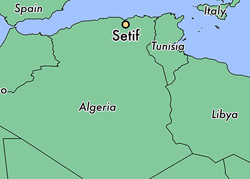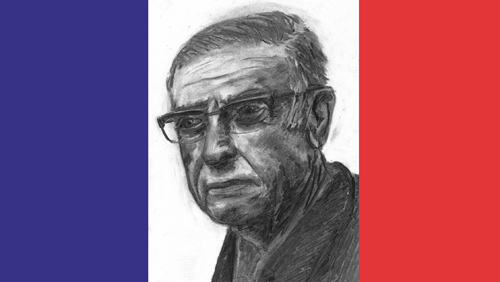
Your complimentary articles
You’ve read one of your four complimentary articles for this month.
You can read four articles free per month. To have complete access to the thousands of philosophy articles on this site, please
Human Rights
I Hate You, My Lovely France!
Hamid Andishan tells us how Sartre, a philosopher of freedom, had problems with the politics of the land of liberté, and how this affected his view of human rights.
Have you ever heard of someone loving and hating something at the same time? It can lead to madness, or at least, to profound anguish. The situation becomes worse if that thing is one’s motherland. Jean-Paul Sartre was in such a situation. He was a French philosopher against France. Philosophical offspring of René Descartes and admirer of Honoré de Balzac, he fought for France in WWII, and was a prisoner of war in Germany; but after the war he turned into a bitter critic of French policy. Why?

Sétif, site of a massacre by the French in May 1945
Sartre had witnessed how France – the land of liberty, equality and fraternity – had acted as a colonial predator in Algeria, Cameroon, and Indochina. In the first editorial of his journal Les Temps Modernes in 1945, Sartre and the phenomenologist Maurice Merleau-Ponty declared that members of the French Resistance who had fought to liberate France during WWII, and who were now in Indochina, were like the German soldiers fighting for fascism. Paris was to him the symbol of freedom against the machinery of fascism (see The Liberation of Paris, 1945), but barely a week after Hitler’s death, the same city of romance and freedom sent troops to commit a bloody massacre in the Algerian market town of Sétif, slaughtering thousands of Algerians. In the years that followed, civilized France continued to brutally repress the growing anti-colonialist movement, frequently sentencing people to death in military courts. This led Sartre to declare, “we are all murderers” in an article of that title published in Les Temps Modernes, No.145, 1958:
“In November 1956 Fernand Yveton, a member of the Combattants de la Libération [a guerrilla group established by the Algerian Communist Party] planted a bomb at the Hamma power station, an attempted sabotage which can in no way equate with a terrorist action. Analysis proved that it was a time bomb precisely set so that the explosion could not occur before the personnel had left. To no avail: Yveton was arrested, sentenced to death, a reprieve was refused, he was executed. Not the slightest hesitation: this man declared and proved that he did not wish to kill anyone, but we wanted to kill him, and we did so without wavering.”
According to Sartre, France was no longer a champion of freedom; on the contrary, it was against freedom. France was playing a double game, trying to take a leading role in the human rights discourse and at the same time repressing native people in its colonized territories. In his preface to Frantz Fanon’s 1961 book The Wretched of the Earth, Sartre says that France should rid itself of France. That is, the ideal free France should separate itself from the colonial France.
René Cassin, a French law professor, was the French representative on the committee drafting the Universal Declaration of Human Rights, and worked to revise its first draft in the years after the war. A wave of nausea would have engulfed Sartre if he had seen that draft, for it declared that human rights presuppose a high degree of civilization, and so do not apply to people in ‘primitive’ stages of development. Such statements indicate that human rights are not for all humans, only for those who are more human. (Remember the declaration of the pigs in Orwell’s Animal Farm: “All animals are equal, but some animals are more equal than others.”)
In any case, Sartre oscillated for three decades towards and away from the idea of human rights, because he was doubtful about the honesty of human rights theory towards those wretched so-called ‘uncivilized’ peoples. If the Declaration was passed by colonial empires such as France and Britain, would it really be peaceful, decent and well-intentioned? Behind this lovely humanitarian smile, was there a set of sharp teeth?
Sometimes Sartre defended the Declaration, because he saw that despite its limitations, it promoted basic rights that every person must enjoy. In his statement ‘On Genocide’ at the Second Session of the Bertrand Russell International War Crimes Tribunal in 1967, he showed his profound concern for universal human rights, condemning the United States for violating them in Vietnam.

Sartre portrait © Athamos Stradis 2017
Yet as a Marxist, Sartre also worried about what he saw as bourgeois elements implicit in the Declaration, particularly extreme individualism. He criticizes ‘the bourgeoisie’ for using an analytic method to explain everything; every composite reality must be reduced to simple elements. Like water that is reduced to oxygen and hydrogen, bourgeois analysis wants to reduce human society to isolated individuals. In Introducing Les Temps Modernes (republished by Harvard University Press as What is Literature and Other Essays), Sartre said he believed that this principle presided over the Universal Declaration of Human Rights as well. But when a people have lost their land, their trade, their young generation, and have nothing except their own being, they do not need individuality and private possessions. On the contrary, they need collectivity rather than individualism. They need to return to their traditional collectivity and their collective right of self-determination.
If he was only a leftist thinker, his position against absolute individualism would be clear; but he was an existentialist too. Individuality is one of the main cornerstones of existentialism. In his 1945 lecture Existentialism is a Humanism, he declared that the existentialist “point of departure is, indeed, the subjectivity of the individual – not because we are bourgeois, but because we seek to base our doctrine on truth.” In Being and Nothingness (1943), he argued that every individual is existentially responsible to undertake and to create his or her way of life. This is the type of existence which Kierkegaard calls singularity or individuality. We must notice that for Sartre, singularity or individuality is different from individualism. Extreme individualism is the negation of any collective identity; however, individuality can incorporate being with others.
Although Sartre belongs to the left side of the debate on human rights, his critiques don’t align exactly with contemporary leftist thinkers such as Slavoj Žižek in ‘Against Human Rights’ (2005). Žižek associates the theory of human rights with liberal capitalism, just as Sartre did; however, he pays attention to a new phenomenon – the phenomenon of humanitarian interference. Critics such as Žižek have recently been witness to the destructive way that Western countries intervene politically, economically and militarily in Third World countries in the name of defending human rights. As Žižek writes: “For example, it is clear that the US-led overthrow of Saddam Hussein, legitimized in terms of ending the suffering of the Iraqi people, was not only motivated by hard-headed politico-economic interests, but also relied on a determinate idea of the political and economic conditions under which ‘freedom’ was to be delivered to the Iraqi people: liberal-democratic capitalism, insertion into the global market economy, etc.”
So it is not easy to say that Sartre was utterly for the theory of human rights, nor completely against it. I should mention two crucial points. Firstly, human rights theory has many humanitarian potentials; one can claim that it at least contains the seeds for equal rights among all human beings. Secondly, if we don’t pay enough attention to the colonial-capitalist establishment’s tendency to protect their political and economic interests, ignoring human rights when they are incompatible with those interests, then human rights theory can be easily misused by those powers.
Combining these positive and negative points, one can say, although Sartre and Third World activists may appeal to Human Rights in their claims regarding human equality and dignity, the history of the Universal Declaration of Human Rights shows that at first the rights were written in defence of European citizens against the terror of Nazism, not in defence of non-Europeans against European colonization.
© Hamid Andishan 2017
Hamid Andishan is currently taking his PhD in Philosophy at the University of Ottawa.









